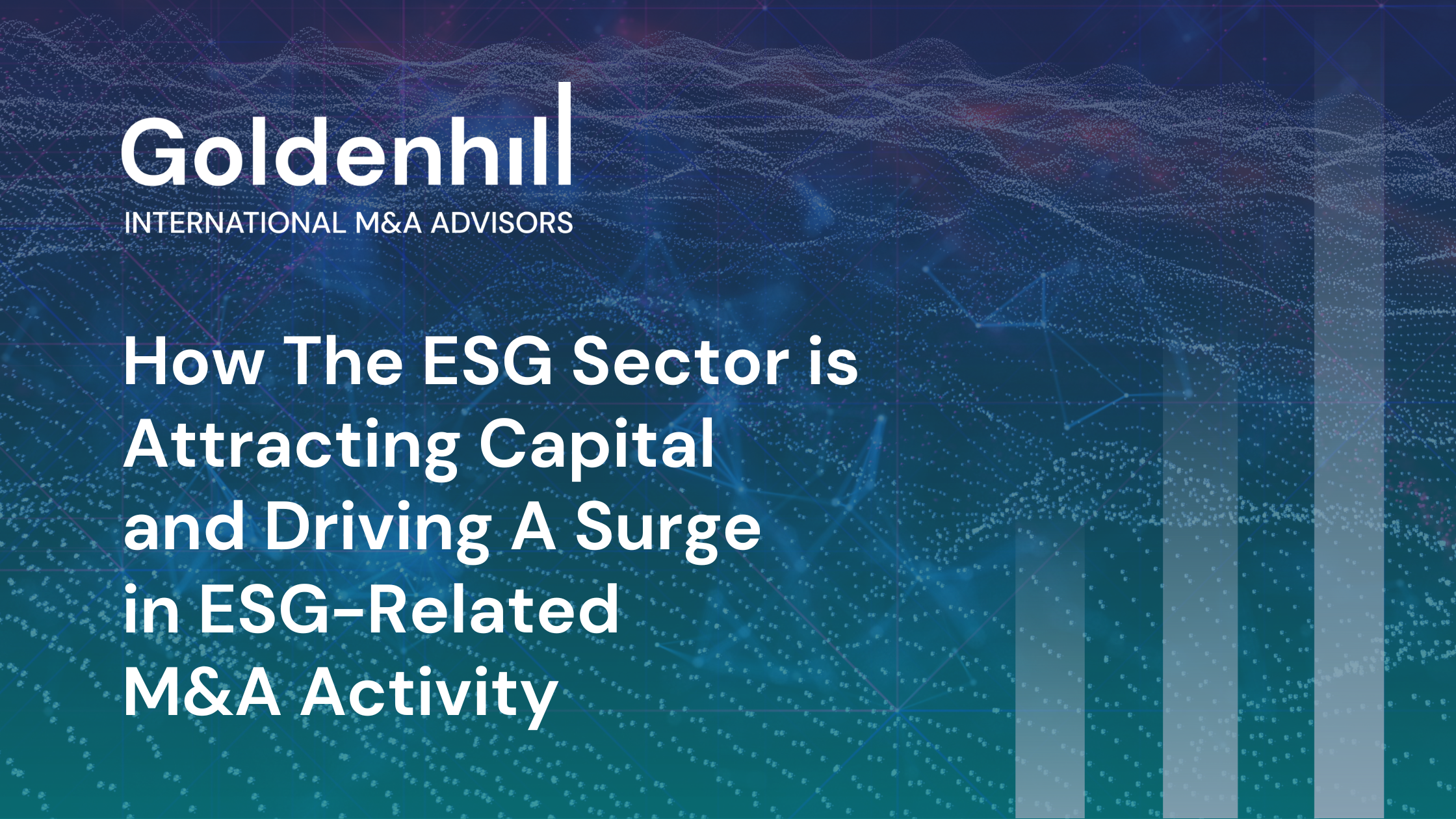
How The ESG Sector is Attracting Capital and Driving A Surge in ESG-Related M&A Activity
The ESG sector has attracted sizable capital in the last 2.5 years and will continue to be a hot area of deal activity as the demand for ESG products and services continues to grow.
In this article, we look at the driving factors behind the surge in ESG-related M&A activity between 2021 and 2022 and review some of the latest M&A transactions in the ESG sector.
Public Demand
In large part the driving force behind sustainable investment originates from the public demand for change. In the UK alone ‘The Environment’ is seen as the most important issue facing the country by around 30% of the population. Worldwide, various movements and increasingly concerning reports have increased the profile of climate concerns to historic heights, encouraging multilateral action – most notably Paris 2015 and most recently COP 26. Similarly, the public is becoming increasingly aware of issues around employee welfare and corporate governance.
The public have been dismayed by reports of inequality, corporate negligence, and unethical behaviour throughout the business world. Under the spotlight of increased public scrutiny corporations are responding to meet their consumers expectations. The withdrawal of corporations from Russia demonstrates the power of public demand – BP for example took a $25.5bn hit from their decision to exit.
Investor Demand
PWC reports 75% of asset management firms say investor demand plays a significant or very significant role in the firm’s ESG focus. This is unsurprising considering 77% of institutional investors are planning to stop buying into new non-ESG products by as early as 2023. Asset managers are therefore working hard to integrate ESG considerations into new funds.
The investor-led demand is expected to drive a 27% CAGR in ESG-based AUM through to 2025, at which stage 1/3 of projected global AUM is expected to be allocated to ESG funds. ESG-committed funds are very popular across alternative asset classes with infrastructure (64% by total class AUM) and private debt funds (59% by total class AUM) recording the highest ESG commitment rates, and Private Equity recording the lowest commitment rate at 34% by AUM.
Given the strong demand from investors and the significant headroom for ESG-fund growth we expect a very strong growth trajectory for the companies providing ESG related services. Government Regulation Worldwide response to climate targets and reporting standards has historically varied, although some convergence is now emerging, for example the voluntary Global Reporting Initiative (GRI) is used by 80% of the world’s largest companies. However, in many of the 130 countries committed to net-zero by 2050, disclosures are expected to become mandatory when guidelines aligned with TCFD (UK) or SASB (US) standards are introduced.
Internal Demand
Historically, employees within a company have also been drivers of change, achieving their demands through applying pressure on management and strike action. As attitudes continue to shift in the public domain so too will the demands of employees.
In the past couple of years several companies like Alphabet, Amazon, and Netflix have seen high profile walkouts, more recently over ESG related issues which have had some success in driving meaningful changes. The power of employees has been recently amplified by the ‘Great Resignation’ which has led to the tightest labour market in decades.
Companies are struggling to attract and retain top talent and are having to adapt to make themselves attractive to talent. 58% of employees consider a company’s ESG priorities when deciding where to work and companies with higher ESG scores show greater retention. While the labour market remains tight, companies will be incentivized to improve their ESG
Government Regulation
Worldwide response to climate targets and reporting standards has historically varied, although some convergence is now emerging, for example the voluntary Global Reporting Initiative (GRI) is used by 80% of the world’s largest companies.
However, in many of the 130 countries committed to net-zero by 2050, disclosures are expected to become mandatory when guidelines aligned with TCFD (UK) or SASB (US) standards are introduced.
ESG And M&A Related Activity
The sector has attracted capital from a wide array of investors: Generalist Data & Ratings providers like Moody’s, S&P, and Morningstar have all acquired companies which will allow them to provide investors more ESG data, such as 427 and Sustainalytics. Exchanges like ICE, Euronext and Deutsche Borse, have been investing in and acquiring ESG risk analytics and investment solutions companies like Urgentem, Impact Cubed and ISS, respectively.
Consultancies like KPMG, McKinsey and PWC have sought to expand their offering into the ESG space through partnerships with physical risk companies such as XDI and Jupiter Intelligence, or through acquisitions of ESG consultancies, like Vivid economics and Accenture.
While large PE firms such as Blackstone, KKR and CVC have sought out strong SaaS businesses in the ESG sector in which to deploy their capital. Even emitters such as Shell Australia and Dupont have been making acquisitions to help them better comply with ESG principles.
The Future of ESG
In the future, ESG considerations will continue to play an ever-increasing role in the global financial markets and businesses will need to monitor and improve their ESG credentials if they want to attract capital.
To find out more about the surge in ESG-related M&A activity, view and download our latest ESG Sector report here.
Author: William Berrington
Partner
Highly experienced M&A advisor with a particular emphasis on ESG and HR Technology globally; assignments include working with leading businesses in ESG (Environmental, Social and Governance) software and data and HR Technology (HRTech).
William has advised on technology sector M&A transactions in more than 12 countries, working on transactions on the sell-side and buy-side. A Chartered Accountant by background, he held corporate development roles at several blue-chip technology companies and also worked for a private markets firm before joining Goldenhill.
If you are an owner or senior executive of a technology business interested in discussing how M&A could help you accomplish your objectives – please get in touch.
